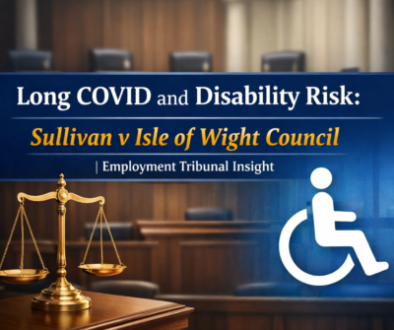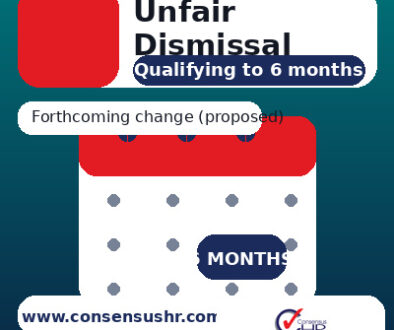£309,867.86 – Borg-Neal v Lloyds Banking Group – Unfair dismissal: Band of reasonable responses | Consensus HR – Herts, Beds

Our Chartered Institute of Personnel & Development – CIPD, have written a great article on: £309,867.86 – Borg-Neal v Lloyds Banking Group – Unfair dismissal: Band of reasonable responses
SUMMARY
When dealing with an employee on their use of an offensive word or phrase, the context within which it was said is a key factor in determining if dismissal is a reasonable response.
LAW
The test for unfair dismissal is set out in section 98 of the Employment Rights Act 1996. This section requires there to be a fair reason for the dismissal, which falls within the ‘fair’ reasons laid out in the section (in this case, conduct).
Secondly, employers must act reasonably in dismissing for the fair reason. Guidance for reasonableness was provided in the EAT case of British Home Stores v Burchell [1978]. This set out three stages for determining the reasonableness of the dismissal:
(1) did the employer genuinely believe the claimant was guilty of the alleged misconduct?
(2) was that belief held on reasonable grounds?
(3) was a proper and adequate investigation carried out?
Finally, the tribunal will decide whether it was reasonable for the employer to have dismissed the claimant for that reason. The question is whether dismissal was within the band of reasonable responses open to a reasonable employer, i.e. would another reasonable employer have dismissed in the same circumstances. This includes both the investigation preceding the dismissal and the decision to dismiss.
FACTS
The claimant worked as a manager. As part of its Race Action Plan, the claimant along with 700,000 other employees was invited to attend race education training.
During the training session, whilst the trainer was discussing intent v effect, the claimant asked how they should deal with a hypothetical situation – what if the claimant, a white male, heard someone from an ethnic minority use a word that could be considered offensive if used by another, not of that minority. The specific example they gave was the use of the ‘N’ word by the black community (the claimant later said that they were thinking of the words used in rap music). In the session, they used the full word. The claimant then apologised for using this word and did not say it again. Following the training session, such was the impact on the trainer that they felt they had to take a week off work.

EMPLOYMENT TRIBUNAL (ET)
Note that as an employment tribunal case, this is not binding authority. ET cases may be persuasive on other tribunal decisions, but unlike those courts higher in the system (EAT, CoA, Supreme Court), they do not have to be followed by other courts and therefore the outcome is only indicative of how a similar case might be treated.
The ET made it clear in its judgment that it considered the respondent to have been entirely reasonable in its view that “(1) the full N word is an appalling word which should always be avoided in a professional environment; and (2) even if no malice was intended and the full word was used not as a term of abuse and not as a descriptor of people, nevertheless, simply hearing it said is likely to be intensely painful and shocking for black people…”.
However, this alone did not render the decision to dismiss in this case fair, as the question whether the claimant should have been dismissed for using the full word was a different question to whether or not they should have used it. In the ETs opinion, the respondent likely had the concern that failure to dismiss could be seen as the respondent condoning the use of the word by an employee.
Acknowledging that in many circumstances the above could be grounds for dismissal, on the facts of this case, the ET held that the decision to dismiss the claimant was not within the band of reasonable responses. This was based on the fact that the subject matter of the training session at the time the comment was made was exploring intention v effect. The claimant, in the view of the ET, did not ask this question in order to get the opportunity to use the offensive word “under the guise of an innocent question”. It was asked to deepen their knowledge and clarify an area of confusion. Indeed, the dismissing officer in this case referred to it as a “good question”. As a result, the ET held that the decision to dismiss was unfair. The respondents aim of sending a message of “zero-tolerance policy on any racial discrimination or use of racist language” could have been met with a formal sanction under the disciplinary procedure rather than dismissal.
On a final note, the claimant explained that the question that caused the offense may not have been worded appropriately due to their dyslexia. This had the effect of causing them to keep reformulating questions and spurting things out before losing their train of thought. As a result, the claimant would concentrate more on their complex thoughts than actually formulating questions and on the surrounding social cues. The ET therefore upheld that, on the balance of probabilities, that the claimant’s dyslexia was a strong factor in their use of the full word rather than finding another way to phrase the question.
In the remedy hearing, the claimant was awarded £309,867.86. This included £15,000 injury to feelings award for the shock, hurt, humiliation and damage to their self-esteem, and loss of a job they loved.
Note for employers
This case is a reminder for employers of the importance of making decisions based on the facts and the context of the case at hand, rather than the use of a particular phrase or word in isolation to what was happening at the time. Where a comment is said without malice, and in an effort to further understanding of the subject matter being discussed, then dismissal may be a reaction that goes beyond what was reasonable in the circumstances.
Training on diversity, inclusion, equality and equity, including race education, is a vitally important tool for employers in meeting their obligations to create a discrimination free workplace. And during those sessions, there is a possibility that strongly held beliefs are challenged, and individuals question the use of certain words of phrases in order to understand what they should or should not be saying. There may therefore be times where an incident similar to this case arises. But taking a zero-tolerance stance does not always mean having to to dismiss, as the respondent learned here the hard way.
Our HR comment: Borg-Neal v Lloyds Banking Group – Unfair dismissal: Band of reasonable responses | Consensus HR – Herts, Beds
Matthew Chilcott, FCIPD, ACEL, Owner of Consensus HR comments: “This is a fantastic example of when a decision to dismiss an employee is not fully investigated properly and the appropriate action taken. When investigating an area of concern in the workplace, the investigating manager must ensure that they obtain all the true facts in relation to the incident and then make a decision if it is to go further. This case showed that due to some extremely bad use of language, which should never be tolerated by any company or member of the team, the company made too many assumptions due to the phrase that was used, rather than fully looking into the situation and context of all involved and made the incorrect decision which has now resulted in a hefty award for the company of £309,867.86.”

Contact us now
YOUR OUTSOURCED HUMAN RESOURCES DEPARTMENT.
For further information on any of the HR subjects we provide, please click the heading below:

10 days after the incident, delayed due to the pre-booked leave of the investigatory officer, a HR case was opened by the respondent. During the investigations, a key witness refused to speak to the investigator as they felt too uncomfortable to do so. The teams recording of the session during which the claimant made their comment was also deleted. When asked why they had made the comment, the claimant explained that they had been told the session was a safe space, and that their question was asked to further their understanding of the subject matter of the training, and not intended in any way to cause offence.
The claimant was disciplined on the basis their behaviour breached the respondent’s Colleague Conduct Policy, Code of Responsibility and requirements to act with integrity and in line with the respondent’s commitment to create an inclusive environment for all by being an anti-racist organisation. Further, that their personal integrity had been brought into question and the alleged behaviour may have caused offence, intimidation or cause an external party to feel vulnerable.
Whilst it was accepted by the respondent that the claimant had not intended to cause any hurt, and that the question was valid and without malice, it was held that the claimant should have known better. The claimant should have realised that the use of the full word in a professional environment could have a serious impact, and this situation could not be rectified by the apology immediately offered by the claimant. On the basis of these allegations, the claimant was dismissed for gross misconduct.
Claims including unfair dismissal and disability discrimination were brought by the claimant.




